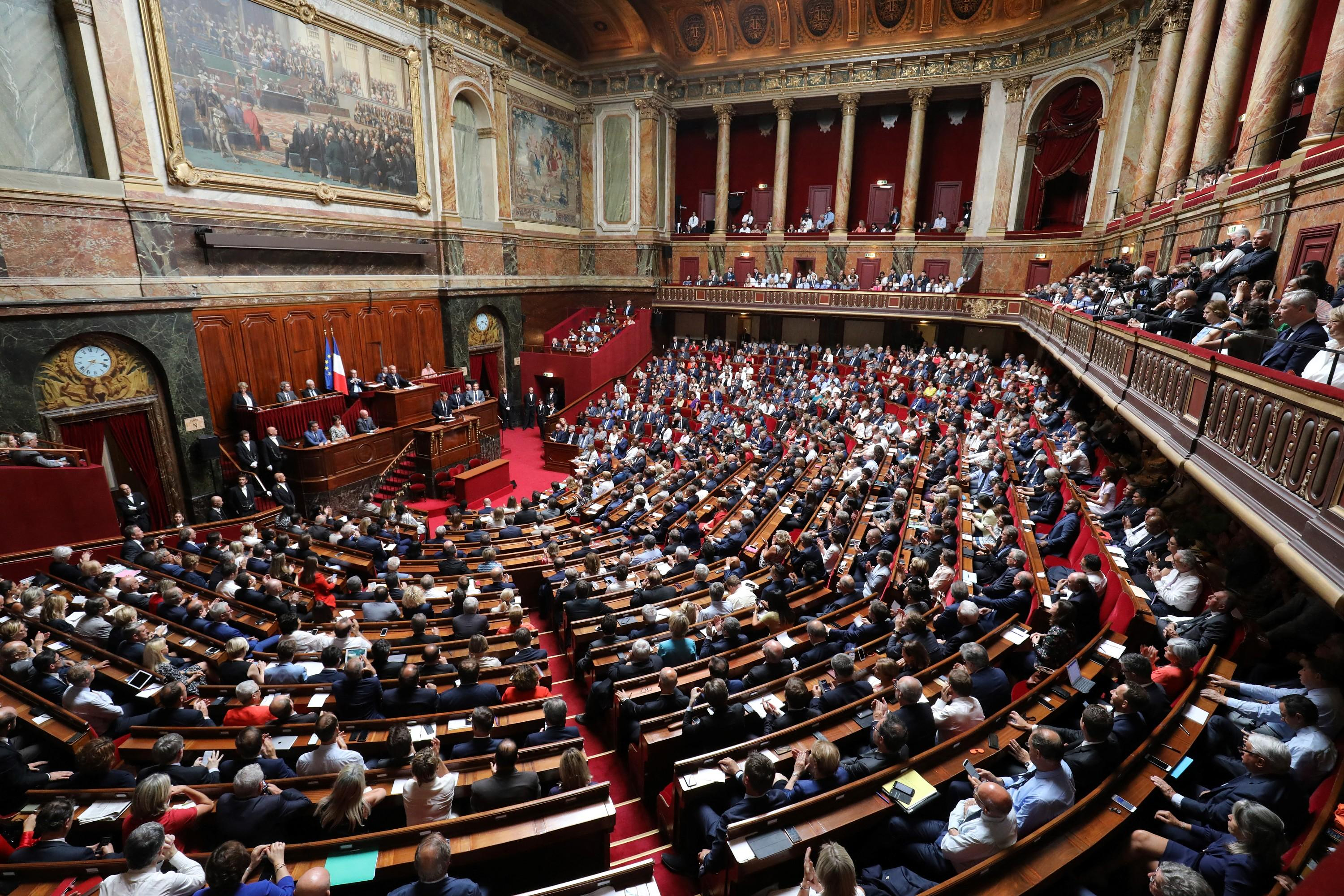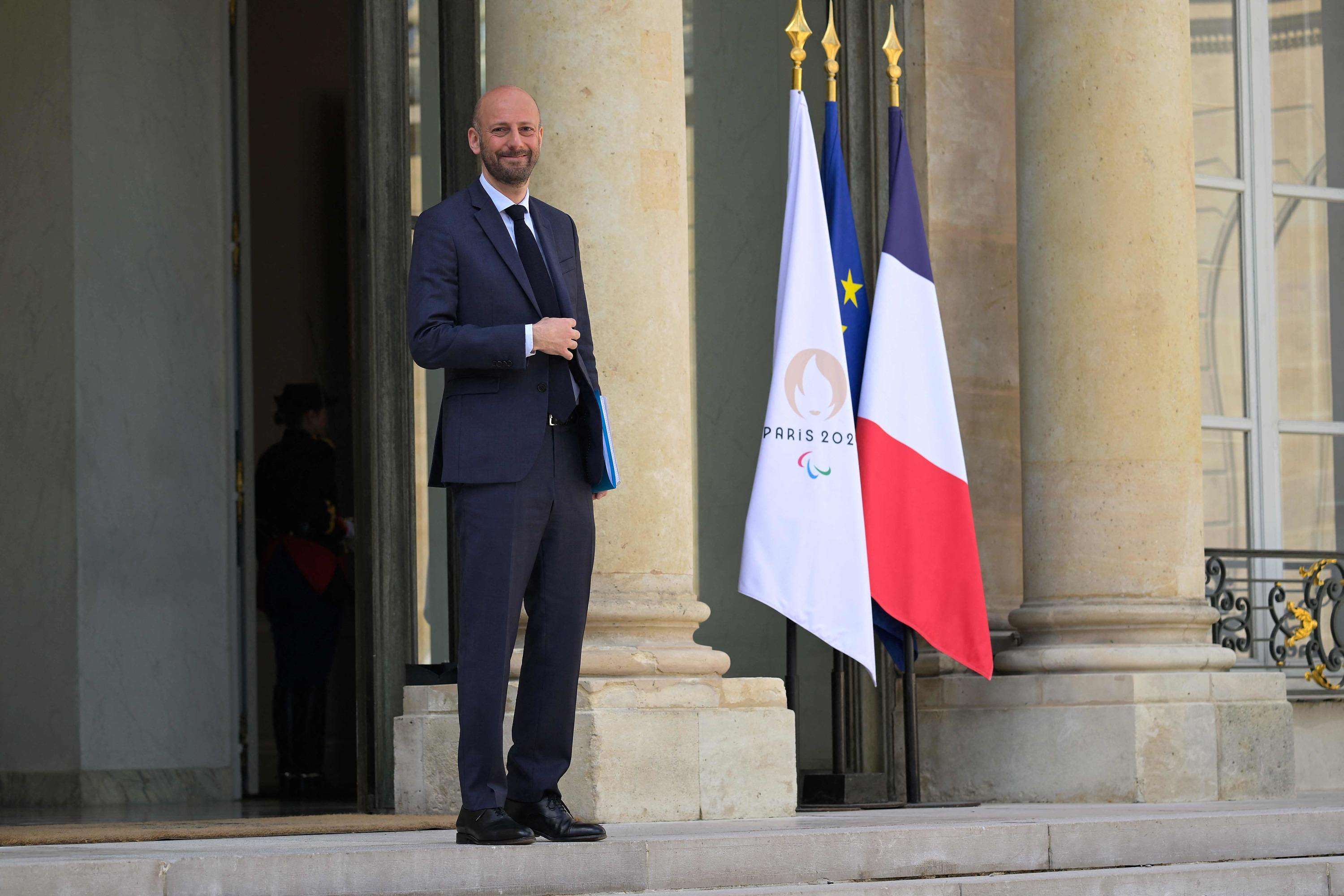Following the vote by the Senate this Wednesday on the bill aimed at including the right to voluntary termination of pregnancy (abortion) in the Constitution, Emmanuel Macron announced that he would convene the Congress this Monday, March 4. A meeting which should, barring any major surprises, result in the final adoption of the bill, four days before International Women's Rights Day. The convening of the Congress is a rare fact of the Fifth Republic, of which Le Figaro provides you with the details.
Congress refers to the joint meeting of the two houses of Parliament: the National Assembly and the Senate. The 925 parliamentarians who make it up are gathered in a single hemicycle, within the Palace of Versailles. Built in 1875, this mecca of the Republic is nevertheless teeming with monarchical references. The Congress Hall is located in a part of the castle closed to the public, the Midi Wing, which was the place of residence of the children of Louis XIV.
Always convened by decision of the President of the Republic, the Congress can occur in three cases: to authorize the accession of a State to the European Union, to hear a declaration from the Head of State or, as is the case next Monday, to revise the Constitution.
Since 1958, he has been summoned 20 times. Four times during a declaration by a president and 16 during a constitutional revision. “Out of twenty-four constitutional revisions, twenty-one were approved by Congress, during sixteen meetings,” specifies the National Assembly website. The meeting on March 4 will therefore be the 25th revision, the bill aimed at including in article 34 of the Constitution, the freedom guaranteed to women to have recourse to abortion.
Modifying the founding text of the Fifth Republic requires a more complex process than changing “ordinary law”. Thus, as stated in article 89 of the Constitution, “the revision belongs concurrently to the President of the Republic” or “to the members of Parliament”. Whether it is a presidential or parliamentary initiative, the text of the revision “must be examined (...) and voted on by both assemblies in identical terms”. Once validated by the two assemblies, either the revision is submitted to a referendum or to a vote by Congress. Emmanuel Macron's choice fell on the second option. A vote which he will not be able to attend, under the separation of powers.
On Monday, deputies and senators will therefore have the responsibility to vote once again on the text. After the Prime Minister's speech, a speaker from each parliamentary group (18 in total) will speak for five minutes. Then, the vote will take place in the rooms neighboring the hemicycle “by means of electronic ballot boxes” and will be open for 45 minutes. To be approved, the draft revision must obtain a three-fifths majority of the votes cast. Of the 925 parliamentarians, at least 555 will therefore need to vote in favor of the text. A formality with regard to the votes of each assembly. At the end of January, 493 deputies supported the revision for 267 senators this Wednesday.

 B:SM will break its investment record this year with 62 million euros
B:SM will break its investment record this year with 62 million euros War in Ukraine: when kyiv attacks Russia with inflatable balloons loaded with explosives
War in Ukraine: when kyiv attacks Russia with inflatable balloons loaded with explosives United States: divided on the question of presidential immunity, the Supreme Court offers respite to Trump
United States: divided on the question of presidential immunity, the Supreme Court offers respite to Trump Maurizio Molinari: “the Scurati affair, a European injury”
Maurizio Molinari: “the Scurati affair, a European injury” Beware of the three main sources of poisoning in children
Beware of the three main sources of poisoning in children First three cases of “native” cholera confirmed in Mayotte
First three cases of “native” cholera confirmed in Mayotte Meningitis: compulsory vaccination for babies will be extended in 2025
Meningitis: compulsory vaccination for babies will be extended in 2025 Spain is the country in the European Union with the most overqualified workers for their jobs
Spain is the country in the European Union with the most overqualified workers for their jobs In the United States, a Boeing 767 loses its emergency slide shortly after takeoff
In the United States, a Boeing 767 loses its emergency slide shortly after takeoff The A13 motorway will not reopen on May 1
The A13 motorway will not reopen on May 1 More than 1,500 items for less than 1 euro: the Dutch discounter Action opens a third store in Paris
More than 1,500 items for less than 1 euro: the Dutch discounter Action opens a third store in Paris 100 million euros in loans, water storage, Ecophyto plan… New measures from the executive towards farmers
100 million euros in loans, water storage, Ecophyto plan… New measures from the executive towards farmers New York justice returns 30 works of art looted from Cambodia and Indonesia
New York justice returns 30 works of art looted from Cambodia and Indonesia Les Galons de la BD dedicates War Photographers, a virtuoso album on the Spanish War
Les Galons de la BD dedicates War Photographers, a virtuoso album on the Spanish War Theater: Kevin, or the example of an academic failure
Theater: Kevin, or the example of an academic failure The eye of the INA: Jean Carmet, the thirst for life of a great actor
The eye of the INA: Jean Carmet, the thirst for life of a great actor Skoda Kodiaq 2024: a 'beast' plug-in hybrid SUV
Skoda Kodiaq 2024: a 'beast' plug-in hybrid SUV Tesla launches a new Model Y with 600 km of autonomy at a "more accessible price"
Tesla launches a new Model Y with 600 km of autonomy at a "more accessible price" The 10 best-selling cars in March 2024 in Spain: sales fall due to Easter
The 10 best-selling cars in March 2024 in Spain: sales fall due to Easter A private jet company buys more than 100 flying cars
A private jet company buys more than 100 flying cars This is how housing prices have changed in Spain in the last decade
This is how housing prices have changed in Spain in the last decade The home mortgage firm drops 10% in January and interest soars to 3.46%
The home mortgage firm drops 10% in January and interest soars to 3.46% The jewel of the Rocío de Nagüeles urbanization: a dream villa in Marbella
The jewel of the Rocío de Nagüeles urbanization: a dream villa in Marbella Rental prices grow by 7.3% in February: where does it go up and where does it go down?
Rental prices grow by 7.3% in February: where does it go up and where does it go down? Even on a mission for NATO, the Charles-de-Gaulle remains under French control, Lecornu responds to Mélenchon
Even on a mission for NATO, the Charles-de-Gaulle remains under French control, Lecornu responds to Mélenchon “Deadly Europe”, “economic decline”, immigration… What to remember from Emmanuel Macron’s speech at the Sorbonne
“Deadly Europe”, “economic decline”, immigration… What to remember from Emmanuel Macron’s speech at the Sorbonne Sale of Biogaran: The Republicans write to Emmanuel Macron
Sale of Biogaran: The Republicans write to Emmanuel Macron Europeans: “All those who claim that we don’t need Europe are liars”, criticizes Bayrou
Europeans: “All those who claim that we don’t need Europe are liars”, criticizes Bayrou These French cities that will boycott the World Cup in Qatar
These French cities that will boycott the World Cup in Qatar Tennis: “I need to regain confidence in my body,” explains Rafael Nadal
Tennis: “I need to regain confidence in my body,” explains Rafael Nadal NBA: Orlando returns to level with Cleveland in the 1st round of the play-offs
NBA: Orlando returns to level with Cleveland in the 1st round of the play-offs Tennis: Iga Swiatek in the round of 16 at full speed
Tennis: Iga Swiatek in the round of 16 at full speed “It was exceptional here in Chaban-Delmas”: Escudero looks back on the excitement around France-England
“It was exceptional here in Chaban-Delmas”: Escudero looks back on the excitement around France-England

















